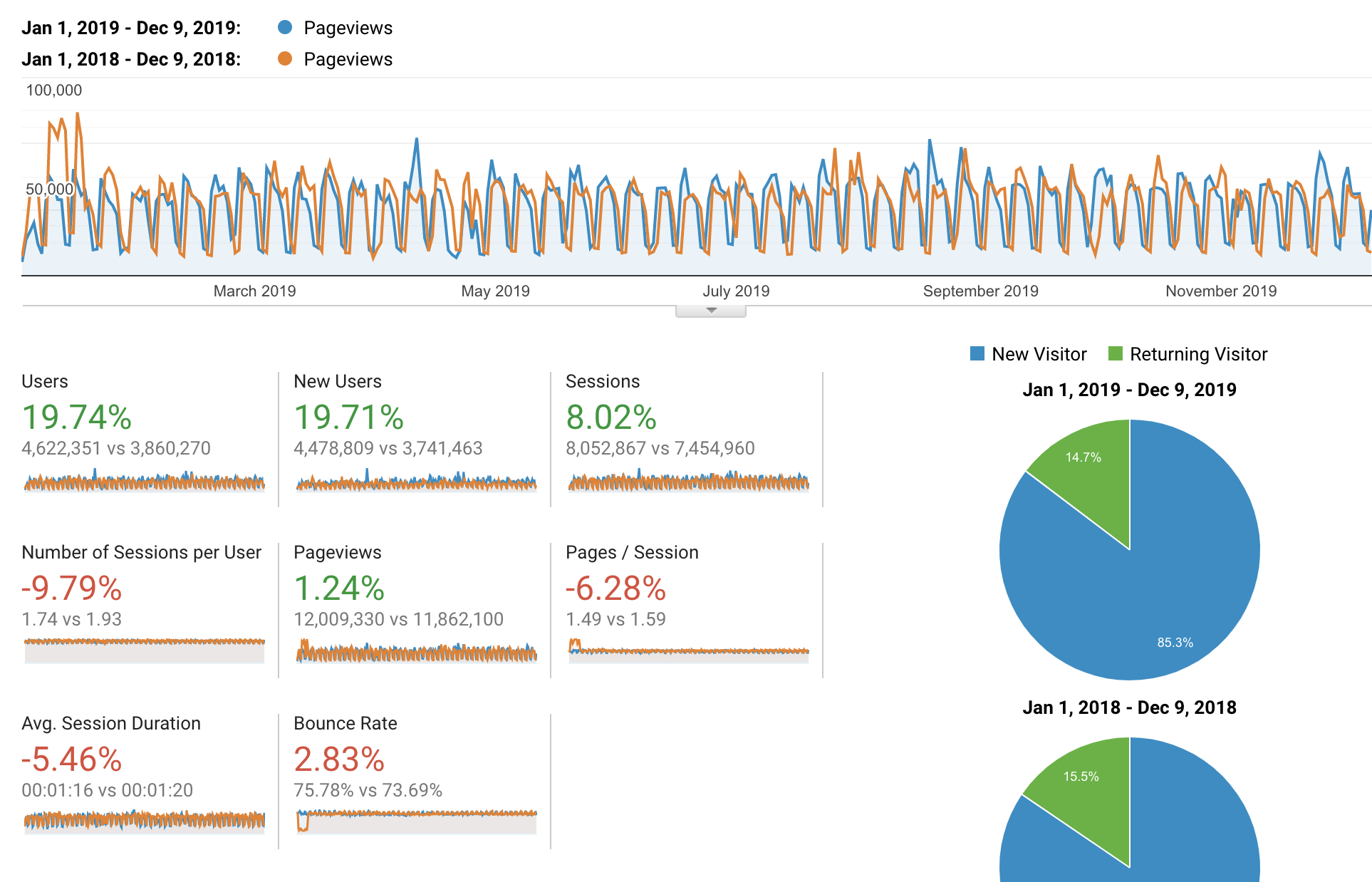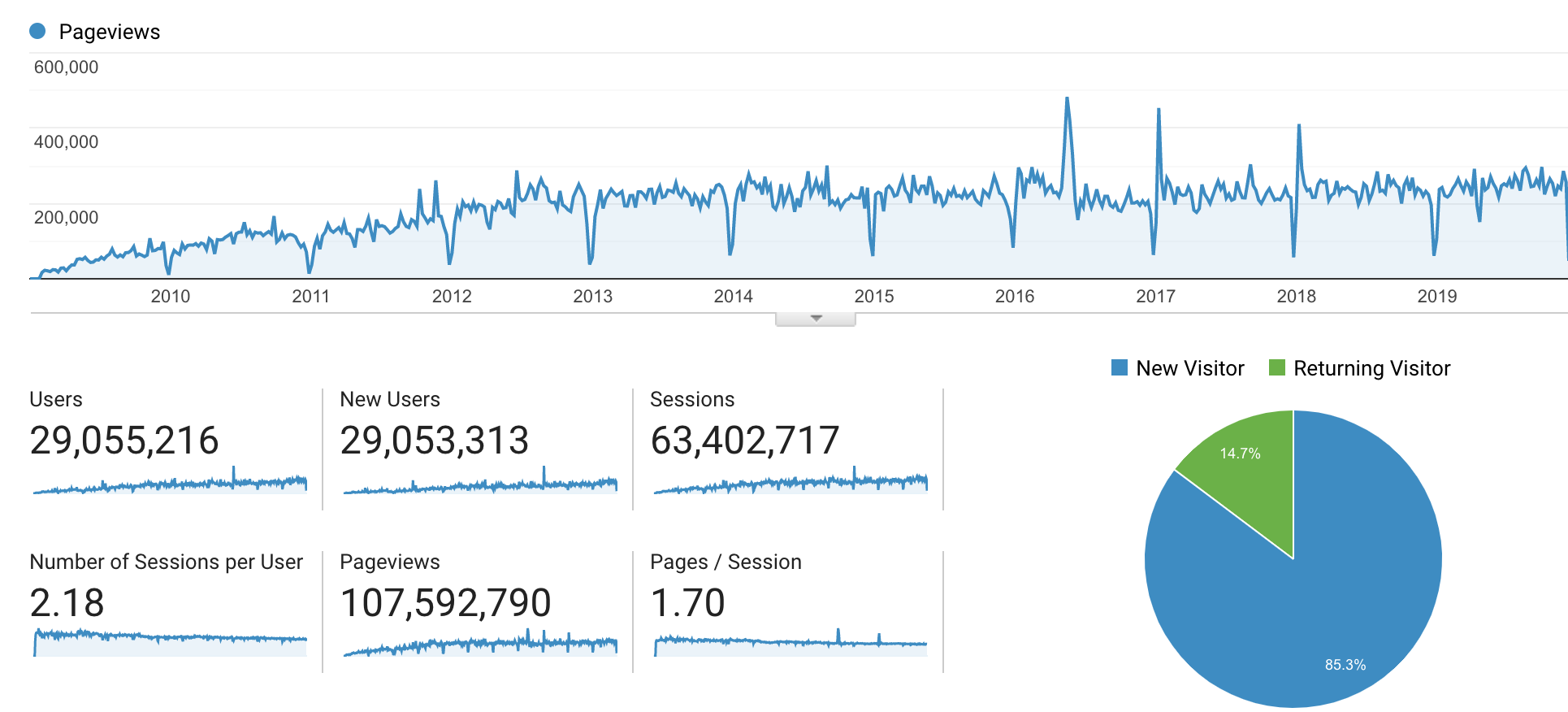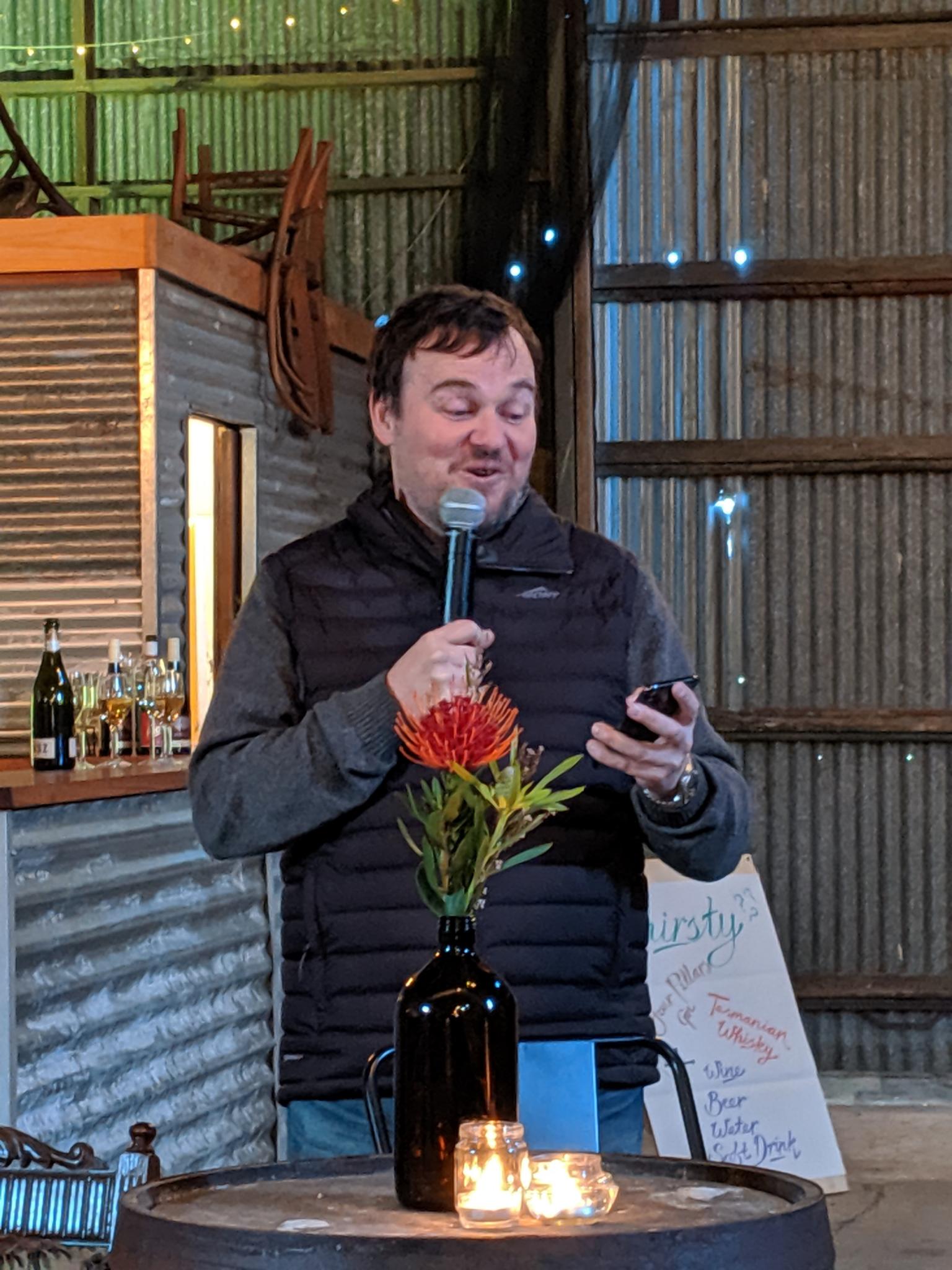Mumbrella is 11: Triumph and failure
As Mumbrella marks its 11th birthday, founder Tim Burrowes offers his annual update on the journey so far.
As anyone who has run a business will know, there’s no such thing as a relentless upwards trajectory.
There are always ups and downs. That’s certainly been the case with Mumbrella. While the overall direction has always been upwards, there’ve been setbacks during the last decade and a bit too.
But the emotions attached to triumph and failure are asymmetrical.
The dominant emotion when we pull off one of our harder challenges is usually simply that of relief. Whereas the failures actually, properly hurt.
We’ve seen a bit of both this month.
But I’ll come to that.
First, the story so far…
You can read my previous updates here:
- Our first post: Welcome to Mumbrella
- Year two: Mumbrella is two
- Year three: Mumbrella is three – thanks for supporting us
- Year four: Mumbrella is four (and a bit)
- Year five: Why I’m stepping down as Mumbrella editor to help grow the business
- Year six: Mumbrella is six – now we’ve got a history
- Year eight: Mumbrella is eight: Beating the burnout
- Year nine: Mumbrella is nine – We’ve joined the two commas club
- Year ten: Mumbrella is ten: Tailwinds and headwinds
As is customary for my annual update, I’ll kick off with a quick update on our audience.
We grew traffic again.
As an editorial team, we aim to deliver 1m page impressions per month. There’s no particular science behind why we aim for that number – in the main, it’s because it’s a target that’s tough but achievable.
And auspiciously, we this week delivered our 12 millionth page impression of 2019, earlier than we’ve ever done in previous years.
We’re on track to break last year’s record of 12,344,873 page views.
And we reached another milestone this year – later than most publishers. More than half of all our page views are now delivered to mobile rather than desktop. The days where Mumbrella’s biggest readership came from people sitting at their desks in the office are over.
That may help explain why our average session duration fell slightly from 1m 20s to 1m 16s.
And since we turned on our Google Analytics in early 2009, we’ve delivered nearly 108m page views.
Not, by the way, that I take any of the credit for this year’s traffic growth. There have been few years where I’ve had less to do with it. I haven’t done a day on the Mumbrella newsdesk since August 11. The credit belongs entirely to our editor Vivienne Kelly and her team.
I’ve been fortunate enough that while my job title rarely changes, my routine varies drastically in any given year.
And this was mostly a non-newsdesk year. In 2019, my working life was dominated by two big projects. In the first half, working with our head of Mumbrella Professional Damian Francis to launch Mumbrella Pro. And more recently, to launch the first Mumbrella Retreats.
We launched Mumbrella Pro in July.
It incorporates the industry’s most comprehensive directory showing which brands work with which agencies – data that was contained in our previous subscription product The Source.
But Mumbrella Pro goes far beyond that, with a growing library of the best audio and video from our conference events.
And in the future, Mumbrella Pro will be where our paywalled content sits. More on that down the track.
And the odd thing about the Mumbrella Pro project is that I never doubted we would hit the launch date. That probably says a lot about Damian and his team, and our developer The Code Company.
Even the night before launch, I didn’t lose any sleep.
And I’m so proud of the product.
However, with the Mumbrella Retreats, it was a different story. The last few months saw me losing sleep over them. It was one of the biggest tests we’ve given to our events team.
I think the stakes felt so high because the possibilities were so big. If we got it right, it had the possibility of becoming a really significant event in the calendar in future years.
I talked about the Retreats in my Best of the Week email a couple of weeks ago.
The next couple of weeks will see the culmination of the project I’ve been waking up thinking of at two in the morning for the last few months. It’s been the hardest new thing we’ve done as a team in recent years.
We’re running two invitation-only industry retreats – one for CMOs, kicking off this Monday, and one for the wider media industry the following week.
We’re putting them in a shed on a hill at the edge of the Sisters Beach national park. You might recall, I own a shack over that way. I found the shed. If it goes wrong, there’ll be nobody else to blame.
We’ve got some fantastic speakers across the two events – including Qantas marketing bigwig Jo Boundy, Tasmania’s favourite son Mark Ritson, IAG CMO Brent Smart, and the newspaper world’s newest proprietor Antony Catalano.
But it’s a retreat, not a conference, so we’ll be stepping out of our guests’ (and my) comfort zone. We’ll be starting the day with meditation, facilitating off-the-record round tables, hiking Rocky Cape, and getting out of the bubble by meeting farmers and talking to the editor of the local paper.
Plus we’ll be wrapping up the decade (only 37 days now until the 20s begin!) by naming Mumbrella’s Brand of the Decade, Creative Agency of the Decade and Media Agency of the Decade. We’ll publish more on those three on Mumbrella next week.
And our delegates – and there are fewer than 40 of them at each of the retreats, so it’s a select group – will also be doing the final round of the judging of our Next Awards for young talent, ahead of next month’s announcement ceremony.
It reminds me of the first year of Mumbrella360. I’m both scared and excited.
There are a lot of logistics for our team to contend with. We’ve taken over every Airbnb for miles. Our guests and speakers are flying in from three different airports. One speaker lands just 20 minutes before he’s due on stage, a 15-minute journey away.
Afterwards, I won’t be able to share everything we hear. For the first time at a Mumbrella event, we’ll be running the process under Chatham House Rules, so we can’t share what individual speakers spoke about.
It all came together. Given we weren’t reporting it, there was no official photographer, although my moment of channeling Tom from Succession was fortunately captured at the welcome dinner, below.
The feedback afterwards still makes me smile. The boss of one big media brand wrote to me over the weekend saying: “I can’t quite put my finger on why, but I left Tasmania thinking it was among the best few days of my professional year.”
But as I say, high and lows. The adrenalin hadn’t cleared my system and the voice lost from days of talking had not yet returned when it was time to turn to our worst moment of the year: This week we closed Mumbrella Asia.
I’ve know it was coming for a while. (Arguably, I’ve been in denial about it for most of the six years we persevered with it.) But pressing the publish button on my announcement on Mumbrella Asia still made me feel a little sick.
You can read the full post on Mumbrella Asia. As I explain in that post, the business model we created in Australia has not worked in the smaller market of Singapore:
However, we were also discovering a couple of things about our strategy.
First, we might call ourselves Mumbrella Asia, but events were such a key part of our business model that really we were Mumbrella Singapore.
Our mature business model in Australia enjoys three major sources of revenue. We have healthy advertising on our website and our daily email newsletter; we do well for sponsorship of our conferences; and we generate good revenues from event ticket sales.
For Mumbrella Asia, we were never able to kickstart that advertising stream. The market norm wasn’t there. In Australia, five years before, we’d been successful in persuading traditional print advertisers within the trade press that it was worth investing in digital advertising to talk to our audience. But with Mumbrella Asia, we never pulled off that trick.
I’ve always opposed us taking programmatic advertising. I’m convinced it doesn’t work for B2B publishers. Their audience is too concentrated and too niche for it to be valued properly by algorithms.
A few months ago, as something of a last throw of the dice, I argued that we should give programmatic a try. Surely our 2.5m page impressions a year had to be worth something?
Even if we only pulled in a CPM of $10 (a fraction of our rate card) for two ad slots per page, that might contribute $50k per year.
In truth, we’d left that experiment too late. The early stages saw it return CPMs in the cents rather than dollars, and in cash terms just a couple of hundred dollars per month.
Which left us with the other two parts of the business model – event sponsorship and ticket sales.
And that’s the point I was making about us being Mumbrella Singapore, not Mumbrella Asia. Events are, in the most part, attended by a local audience. When we launched, we told ourselves we were entering a bigger market than Australia. In truth, we were going into a smaller one.
Which means that no matter how proud we may be of what we have achieved here in Australia over 2019, I risk finishing this note on a low. Three very professional members of our team have had their careers affected despite delivering what we asked of them. I feel that as a responsibility and as a personal failure.
Like I say, there’s no such thing as a relentless upward trajectory.
However, there is an upbeat finish.
This week also sees the running of another new Mumbrella event. And in keeping with the theme of the year, it’s another success I have had little to do with.
We expanded Mumbrella Next from an awards recognising new industry talent to a day designed for people entering the first years of their career.
It was the brainchild of our events journo Abigail Dawson, who conceived the idea and curated the program. More than 100 people bought tickets to see a great program of senior industry execs. I’m sure it will be even bigger next year.
And next year will indeed see new beginnings for Mumbrella.
In late January we’re due to move into our new offices in Walker Street in North Sydney. We’ll be sharing the office with our colleagues from Diversified Communications.
And the space will be quite something – including a podcast studio and, most excitingly, a dedicated events space where we’ll be able to run training and other events.
So there’s lots to look forward to.
For now though, as I say every year: Thanks for reading and supporting us.






Well done on eleven years.
Pity Mumbrella still sticks with PIs as a success measure. It’s SO turn of the century.
Great post as always from Tim Burrowes and Mumbrella! If only more media business owners would dial up the honesty and dial down the management speak and BS!
I really appreciate your Openness and honesty in these updates. Thanks for another year of keeping us updated on the latest news & holding us all accountable when he get to caught up in the industry bubble
Can you put some main events in Melbourne next year.
+1
Melb needs more event love (plus we afterparty harder than Sydney!)
nice article Tim. Congrats on the year and while the Asia news isn’t what you’d have hoped for, congratulations on having the guts and clarity to move on…hopefully to more achievement down the track.
you, Damian, Viv and team have all earned a few Christmas drinks and I hope to see you all in 2020